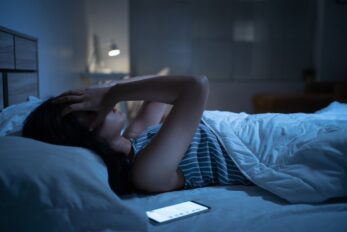There’s a certain freedom behind the adage, “age is just a number”. It reminds us not to worry about conforming to age-based expectations. After all, you can’t help growing older, but that doesn’t mean you have to look, feel or behave your age!
When it comes to your sleep, it turns out age is intimately linked with how much you should be getting. You’ve probably heard the standard recommendation of 7 to 9 hours, which is a good starting line, but it’s good to think of it as a broad range the general population should be aiming to fall within. Realistically, you may fall outside this range, and that’s perfectly normal.
So, how do you judge if you’re getting enough sleep? Well, if you wake up most mornings feeling rested and can function throughout the day, you’re probably doing just fine. If not, consider how your age may factor into your own personalized sleep requirements.
So, are you and your loved ones getting enough age-appropriate sleep? Let’s find out.
Snoozing through the ages
Unsurprisingly, children have the greatest variations in recommended sleep time. Newborns and toddlers fall in the range of 12 to 17 hours per night. While we typically recommend teenagers sleep 8 to 10 hours per night, they may end up sleeping as much as a toddler some nights—especially on weekends!—thanks to continuing growth and fluctuating hormones. Sound familiar?
Adults, on the other hand, have a more normalized recommendation. From ages 18 to 64, we typically recommend 7 to 9 hours per night, with the exception of anyone 65 and over who can get by on 7 to 8 hours. However, a number of factors will influence our nightly sleep requirements, not just age.
Barriers to better sleep
It’s been suggested that our need for sleep doesn’t actually decrease with age—rather, our ability to get the sleep we need decreases with age. For example, you’ll likely undergo qualitative and quantitative changes in your sleep the further you get into your golden years. This might mean having more trouble falling asleep at night, waking up more frequently, or being unable to stay asleep as long as you used to. These altered sleep patterns are also likely tied to external lifestyle factors—retirement, sleeping environment, and changes in metabolism to name a few.
Meanwhile, in adolescents and teenagers, sleep has some serious competition. Screen time, social commitments, fixed school and activity start times, and of course, hormones, all play a role in how much or little sleep they might get. Throw in health problems, a lack of physical activity, and family dynamics, and the sleep equation gets even more convoluted. So, is there really a set optimal amount of sleep you should be getting?
Does an optimal amount of sleep exist?
In a word, no. But it all comes down to the definition of optimal sleep. Optimal sleep may mean the recommended amount from public health officials. It may mean the amount of sleep that lets you stay fully awake throughout the day with normal levels of performance in your required tasks. It may also refer to how refreshed you feel when you wake up in the morning.
So, while there’s no set magic number that you should be aiming for each night, there will be a number that works best for you. Something that’s uniquely yours. Instead of trying to fit yourself into a generic sleep requirement, think about your own personal needs.
How much sleep do you need?
Trying to figure out how much sleep you need? Think back to a day when you woke up easily and felt fully awake and engaged throughout the day, like you were firing on all cylinders physically and mentally. How much did you sleep that night? When did you go to sleep and when did you wake up? Did you do any nighttime rituals like reading instead of watching Netflix before bed?
Only you can decide how much sleep is enough, but be careful: Don’t settle for less sleep just because you think you can get away with it! When you get the amount of sleep you truly need, your brain and your body will thank you for it—at any age.
Trouble sleeping? Book a complimentary sleep consultation and we’ll help you get back on track for a good night’s rest.
We wrote this post referencing information from PubMed Central. You can read the full journal here.






